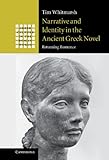Narrative and identity in the ancient Greek novel : returning romance / by Tim Whitmarsh.
Material type: TextLanguage: English Series: Greek culture in the Roman worldPublication details: Cambridge ; New York : Cambridge University Press, 2011.Description: xii, 299 p. ; 24 cmISBN:
TextLanguage: English Series: Greek culture in the Roman worldPublication details: Cambridge ; New York : Cambridge University Press, 2011.Description: xii, 299 p. ; 24 cmISBN: - 9780521823913 (hardback)
- 883/.0109 23 WHN 2011
| Item type | Current library | Call number | Status | Date due | Barcode | |
|---|---|---|---|---|---|---|
 Books
Books
|
Eastern University Library General Stacks | 883.0109 WHN 2011 (Browse shelf(Opens below)) | Not For Loan | 14188 |
Browsing Eastern University Library shelves, Shelving location: General Stacks Close shelf browser (Hides shelf browser)

|
No cover image available No cover image available |

|

|

|

|
No cover image available No cover image available | ||
| 873 MAC 1997 The Cambridge companion to Virgil / | 882.01 OBT 1968 Twentieth century interpretations of Oedipus Rex: | 882 HEC 1990 The cure at Troy : | 883.0109 WHN 2011 Narrative and identity in the ancient Greek novel : | 883 FOC 2004 The Cambridge companion to Homer / | 883 FOC 2004 The Cambridge companion to Homer / | 890.39 SHO 2022 শোকাশ্রত / |
Includes bibliographical references (p. 265-294) and index.
Machine generated contents note: Introduction; Part I. Returning Romance; 1. First romances: Chariton and Xenophon; 2. Transforming romance: Achilles Tatius and Longus; 3. Hellenism at the edge: Heliodorus; Part II. Narrative and Identity: 4. Pothos; 5. Telos; 6. Limen; Conclusion; Appendix: the extant romances and the larger fragments.
"The Greek romance was for the Roman period what epic was for the Archaic period or drama for the Classical: the central literary vehicle for articulating ideas about the relationship between self and community. This book offers a fresh reading of the romance both as a distinctive narrative form (using a range of narrative theories) and as a paradigmatic expression of identity (social, sexual and cultural). At the same time it emphasises the elasticity of romance narrative and its ability to accommodate both conservative and transformative models of identity. This elasticity manifests itself partly in the variation in practice between different romancers, some of whom are traditionally Hellenocentric while others are more challenging. Ultimately, however, it is argued that it reflects a tension in all romance narrative, which characteristically balances centrifugal against centripetal dynamics. This book will interest classicists, historians of the novel and students of narrative theory"--
There are no comments on this title.
